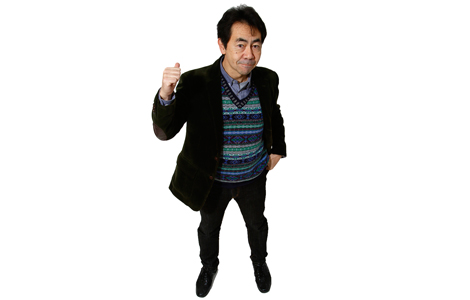ARAKAWA Yohey

- 役職/
Position - Professor at Institute of Japan Studies
- 研究分野/
Field - International Linguistics Audit / Applied Cognitive Linguistics
Re-thinking globalization from the framework of "understandable Japanese"
Moshimo...anata ga gaikokujin to "nihongo de hanasu" to shitara [What If You Were to Converse in Japanese with a Foreigner]. This is the title of a book I published in 2010, and it basically summarizes my current research topic. International linguistic audit is my primary field of study.
When you talk to someone in Japanese, you use keigo (honorific/modest language) with people you have met for the first time or with people more senior than you, and you use familiar language with friends and family. Then what if you were talking to a foreign national? I suspect you make your sentences short or speak slowly. In fact, Japanese language teachers are the most skilled and have the most know-how regarding Japanese that is easy to understand for foreign nationals. I have been a Japanese language teacher for nearly 30 years, and based on my experience, I hope to put into writing for Japanese people text which outlines this information and which presents theories on Japanese that is easy to understand for foreign nationals.
In Japan, there is a growing momentum to become fluent in English as the number of foreign visitors to Japan increases, and in the lead-up to the 2020 Tokyo Olympic Games. While I am not trying to say that this is wrong by any means, I would say that another approach to making Japan more international is to communicate using Japanese that is easy to understand also for foreign nationals. For this reason, I am engaged in an effort that promotes the use of Japanese that is understandable for foreign nationals, involving not only researchers but also advertising agencies, the mass media, and other stakeholders.
The cognitive foundation of people has commonality to some extent, irrespective of language. For example, the words "mae /ushiro" [front/back] do not merely indicate direction, but are also related to the words "mirai /kako" [future/past]. In extremely broad terms, it can be said that people generally share the same physical attributes and their only differences are the sound of their languages and their meaning--in other words, their system of symbols. This is the concept of my other research theme, Cognitive Linguistics. These perspectives are important in international linguistic audit.
In the Master's Program in Japan Studies that will start in April, I will be teaching a course called "Basic Studies in Japanese Language Education." It is for graduate students who are not focusing on TJSOL, Teaching Japanese to Speakers of Other Languages. I imagine that many graduate students will be doing study abroad programs. When they do, the local people will probably ask them to teach them Japanese. My course will give guidance on how students can handle teaching Japanese using only Japanese, not relying on English, by interweaving the perspectives of international language audit and Cognitive Linguistics that I mentioned earlier.
The world is undergoing significant changes. Countries in Asia, Africa, as well as South America are increasing their presence. Simply equating globalization with English is convenient at first glance, but this convenience comes at the cost of diversity, and such a trend would be an antithesis to globalization. Fortunately, TUFS offers 27 languages, and English and Japanese are merely two of these languages. I hope students will take advantage of their studies at TUFS to consider how Japanese language can be structured to make it more understandable to foreign nationals from a multi-dimensional perspective.




